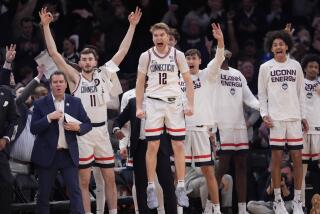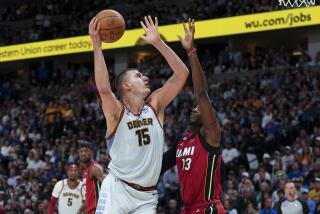Television Spends an Expensive Saturday at Sports Arena : Women’s basketball: Lengthy doubleheader cuts commercial time from men’s Final Four pregame show.
- Share via
For women’s basketball, Saturday in Los Angeles was a grand day. The semifinals of the Final Four were played at the Sports Arena, the attendance was reported as only a couple of thousand shy of capacity and the showcase second game between Stanford and Virginia was a thriller.
For CBS television, Saturday in Los Angeles was a day from hell.
The dominoes started falling early, when the first half of the 9:30 a.m. game between Southwest Missouri State and eventual 84-72 winner Western Kentucky took more than an hour to play. It had begun a day of college basketball that was to include Stanford and Virginia at about noon Pacific time, followed by the men’s Final Four doubleheader in Minneapolis of Michigan and Cincinnati at 2:42 p.m. and Duke and Indiana at about 5.
The reason for the slow opener was ragged and rugged play by Southwest Missouri State and Western Kentucky. At the end of the game, Western Kentucky had committed 32 fouls and had four players fouled out, and Southwest Missouri had 31 fouls and three players fouled out. Southwest Missouri State had 29 turnovers, Western Kentucky 28. The game had more stops and starts than a mailman, and referees Art Bomengen and Dee Kantner easily could have called more.
Watching it all, with increasing horror, was Brian Fielding, director of programming for CBS Sports.
“Yes, we are in trouble,” Fielding said early in the second half of the Stanford-Virginia game. “It (the first game) was dreadful. From a TV standpoint, it is unfortunate to have a game that is not even an overtime game take 2 hours and 30 minutes to play.”
Fielding’s concern was that the length of the first game pretty much knocked out the lucrative men’s pregame show. That was the built-in fallback for the network, should the women’s event run long in Los Angeles. But it wasn’t a desirable fallback.
“We don’t like to cut into the men’s pregame show,” Fielding said, “because it produces substantial revenue.”
In other words, the Southwest Missouri State-Western Kentucky rugby match was costing CBS big bucks. Fielding wouldn’t comment on how big, but speculation might bring the following scenario: Were the men’s pregame show to start on time at 2 p.m. and run its full 42 minutes for the start of Cincinnati-Michigan, there might be eight minutes of commercial time run. If each minute sold for $125,000, CBS would be out $1 million. And those numbers are probably conservative.
The second half of the Stanford-Virginia game started at 1:40 p.m., 20 minutes before the scheduled start of the men’s pregame show and 1 hour 2 minutes before the Cincinnati-Michigan tip-off time. When it was time for the men’s pregame show to begin, 11:52 remained in the second half at the Sports Arena.
And, for CBS, it got both better and worse.
Stanford’s eventual 66-65 victory was the kind of sports drama television craves for its viewers--late heroics, last-second shot attempts, a series of late timeouts for strategy and even the addition of eight-tenths of a second to the clock after the game had been ruled as completed. High drama, but drama being played out with the probable loss of major-network revenue.
Midway through the second half, when it became obvious that any sort of significant men’s pregame show was out of the question, Fielding and CBS decided that, since they would not cut away from a major live event, they would recoup as best they could, sliding back the start of the men’s opener in Minneapolis to about 3 p.m. and jamming in as many commercials as they could.
The Stanford-Virginia game ended at 2:49, CBS quickly ran the credits and some statistical graphics, ran three national commercials after a local Channel 2 promotional ad and cut to a highly abbreviated pregame show that went from 2:52 until tip-off at 3:03. Instead of 42 minutes of lucrative hype, CBS could run only 11.
After the Stanford-Virginia game, a philosophical Fielding had found a silver lining.
“That’s what you get when you buy into live sports events,” he said. “Besides, the second game was a great one.”
More to Read
Go beyond the scoreboard
Get the latest on L.A.'s teams in the daily Sports Report newsletter.
You may occasionally receive promotional content from the Los Angeles Times.










